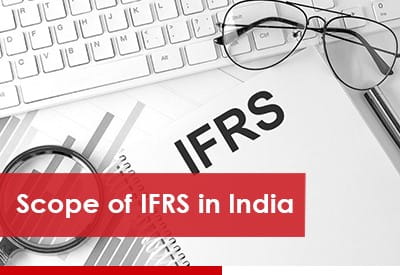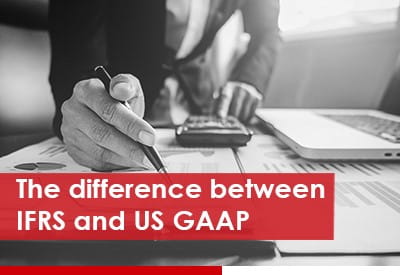
The Difference Between IFRS and US GAAP
July 27, 2023- Understanding IFRS and its Evolution
- The Importance of IFRS Certification
- Scope of IFRS Certification
- IFRS Certification Programs
- Conclusion
As the adoption of Dip IFRS continues to grow worldwide, the demand for professionals with IFRS expertise and certification has surged significantly. In this blog, we will explore the scope of IFRS certification and its importance in the contemporary financial landscape.
Understanding IFRS and its Evolution
IFRS, developed and issued by the International Accounting Standards Board (IASB), is a set of accounting standards designed to improve the quality, comparability, and transparency of financial reporting. It provides guidelines on how different financial transactions and events should be recognized, measured, presented, and disclosed in financial statements.The origins of IFRS can be traced back to the 1970s when various countries sought to harmonize accounting practices internationally. Over time, the standards evolved and gained broader acceptance as more countries embraced them. Today, IFRS is utilized in over 140 countries, including many major economies like the European Union, Australia, Canada, and India. This global acceptance has facilitated cross-border investments, reduced information asymmetry, and enhanced the confidence of stakeholders in financial reporting.
The Importance of IFRS Certification
With the widespread adoption of IFRS, the demand for professionals with comprehensive knowledge and understanding of these standards has grown considerably. Obtaining an IFRS certification not only enhances an individual’s career prospects but also brings several benefits to organizations and stakeholders due to the expanded scope of IFRS application:- Global Recognition: IFRS certification is globally recognized and demonstrates an individual’s ability to apply IFRS principles in practical scenarios. This recognition is especially valuable for professionals seeking international career opportunities.
- Improved Financial Reporting: Certified IFRS professionals possess the expertise to ensure that financial statements are prepared in compliance with the latest accounting standards, leading to accurate and transparent reporting. This, in turn, enhances the credibility of financial information, fostering investor trust and confidence.
- Better Decision-making: Organizations benefit from having IFRS-certified professionals in their finance teams as they can provide valuable insights and analysis based on standardized financial information, leading to more informed and strategic decision-making.
- Enhanced Job Prospects: As more companies transition to IFRS, there is a growing demand for professionals with IFRS expertise. Holding an IFRS certification gives individuals a competitive edge in the job market, opening up career opportunities in accounting, auditing, financial analysis, and advisory roles.
- Compliance and Risk Management: With the complexity of financial reporting increasing, ensuring compliance with IFRS is crucial for avoiding legal and financial risks. IFRS-certified professionals can help organizations navigate these complexities and mitigate potential risks.
- Investor Confidence: For investors, financial statements prepared in accordance with IFRS provide a consistent and reliable basis for comparison between companies operating in different jurisdictions. This comparability improves the assessment of investment opportunities and reduces uncertainty.
Scope of IFRS Certification
The scope of IFRS certification extends beyond the traditional boundaries of accounting and finance. While accounting professionals, such as auditors, financial analysts, and accountants, are the primary beneficiaries of IFRS certification, several other roles can also benefit from obtaining this credential:- Corporate Executives and Directors: Corporate executives and directors play a critical role in overseeing financial reporting and governance. An understanding of IFRS enables them to make more informed decisions, evaluate financial performance accurately, and fulfill their fiduciary responsibilities.
- Business Consultants: Business consultants often advise clients on financial matters, mergers and acquisitions, and strategic planning. IFRS certification equips them with the necessary knowledge to guide clients through accounting-related challenges effectively.
- Entrepreneurs and Start-up Founders: For entrepreneurs and start-up founders, IFRS certification can be advantageous when seeking funding or partnerships. Investors are more likely to trust financial information prepared using internationally accepted standards.
- Regulators and Standard Setters: Regulators and standard setters, responsible for developing and implementing financial reporting frameworks, benefit from IFRS certification as it provides them with deeper insights into global accounting practices and standards.
- Academics and Researchers: IFRS certification can be valuable for academics and researchers studying accounting, finance, or corporate governance. It allows them to have a practical understanding of financial reporting practices used in various industries and countries.
IFRS Certification Programs
Numerous institutions and professional bodies offer IFRS certification programs tailored to different levels of expertise, ranging from introductory courses to advanced professional certifications. Some of the most well-known and respected IFRS certification providers include:- Association of Chartered Certified Accountants (ACCA): ACCA offers the ‘Diploma in International Financial Reporting’ and the ‘Certified IFRS Professional’ designation.
- Chartered Institute of Management Accountants (CIMA): CIMA offers the ‘Certificate in International Financial Reporting.’
- Certified Public Accountant (CPA) Australia: CPA Australia offers the ‘International Financial Reporting Standards Program.’
- Deloitte, Ernst & Young, KPMG, and PwC: These Big Four accounting firms provide in-house IFRS training and certification programs for their employees.
Conclusion
The scope of IFRS certification is vast and continues to expand as more countries adopt IFRS and seek convergence with global accounting standards. The certification not only enhances the career prospects of individuals in the accounting and finance fields but also benefits a wide range of professionals and stakeholders involved in decision-making, financial reporting, and governance.In today’s interconnected world, IFRS plays a pivotal role in fostering transparency, comparability, and reliability in financial reporting, strengthening investor confidence, and facilitating cross-border investments. As the demand for IFRS expertise grows, pursuing IFRS certification remains a valuable investment for professionals seeking to thrive in the dynamic and evolving global financial landscape.




